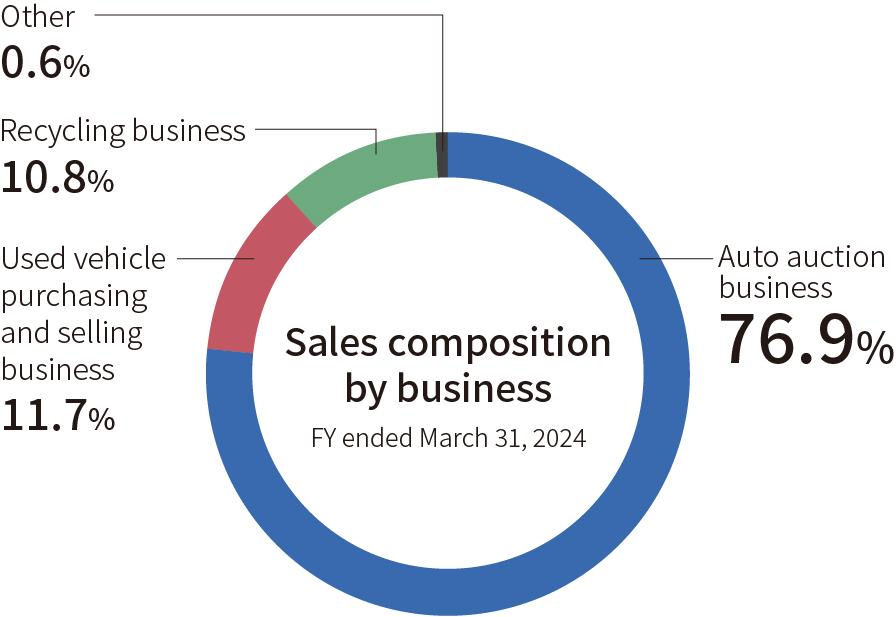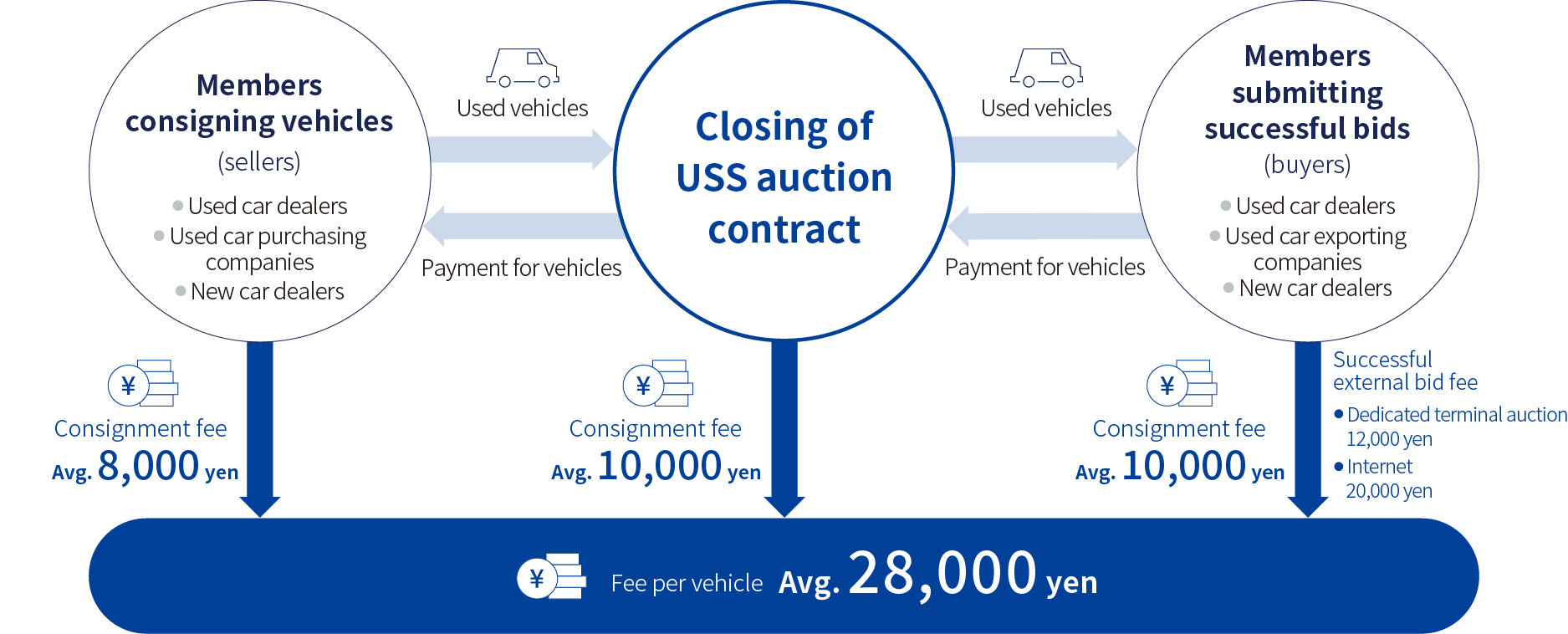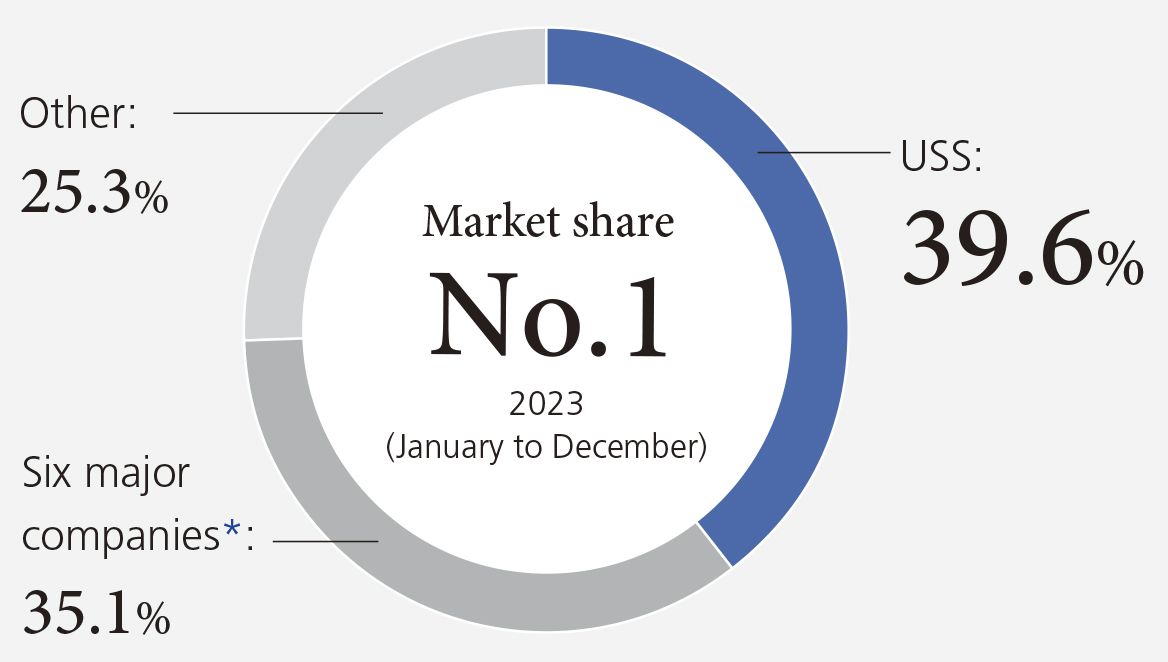USS Business
Three unique businesses
Net sales by business FY ended March 31, 2025

Auto auction business
Auto auction sites support trouble-free circulation of used vehicles. USS currently supports bidding from outside the premises through dedicated terminal and internet auctions around 19 auction sites throughout Japan.
| SWOT analysis | Description | Responses & Countermeasures |
| Strength | ● The largest number of members and vehicles in Japan's auto
auction industry ● Highly advanced vehicle inspection technologies |
● Maintain fair and equitable transactions and improve technologies ●Implement a short-term intensive vehicle inspector training program |
| Weakness | ● An insufficient number of vehicles procured by Group companies for auction due to inadequate Group collaboration ● A labor shortage including automotive inspectors and document verification staff |
● Develop systems under the "50% Market Share" strategic project and strengthen Group collaboration through the introduction of new services ● Recruit new employees and improve the workplace environment through the "Workplace Environment Improvement Project" and other initiatives |
| Opportunity | ● Replacement demand due to the increased supply of new vehicles within Japan ● Increased sophistication and diversification of AI technologies |
● Implement new membership system eliminating the need for guarantors ● Introduce new services by linking VIN numbers and improve member convenience by improving provided images of vehicles |
| Threat | ● Stagnation in land transport due to lack of drivers ● Pressure from manufacturer-affiliated auto auctions |
● Review various measures such as improving the operational efficiency of auto auction sites and establishing vehicle storage lot depots ● Provide new services to specialized used car dealers |
Used vehicle purchasing and selling business
The Rabbit Car Network is launching chains and franchises in all areas of Japan as stores specializing in the purchase of used vehicles from end users. This is the backbone to lively auto auctions. Although most of the vehicles that are bought are sold at auction, some are sold through retail channels.
| SWOT analysis | Description | Responses & Countermeasures |
| Strength | ● A business model closely linked to USS auctions ● A trusted brand in the used car purchasing market |
● Develop business through better Group cooperation ● Strengthen corporate branding with a focus on reliability and trust |
| Weakness | ● Delays in online systems and other digital transformation efforts ● Human resource recruitment, development and retention |
● Expand roll-out of new appraisal system and leverage systems developed by USS ● Expand personnel recruiting budget and methods, and review and improve work styles |
| Opportunity | ● Strong demand in other countries for used vehicles made in Japan ● Deterioration in perceived corporate image due to fraud by other companies in the industry |
● Attract new customers from manufacturer-affiliated dealers by promoting a brand strategy ● Enhance differentiation from competitors based on our brand of reliability and trust |
| Threat | ● Fluctuations in the used car market and foreign exchange rates ● Decrease in the number of franchise stores due to store closures |
● Promote store and brand strategies to increase the number of appraisals ● Expand the number of franchise stores by bolstering Group cooperation |
Recycling business
The Recycling Segment centers upon two Group companies. ARBIZ recycles end-of-life automobiles as well as small electronics and other spent products. SMART specializes in the dismantling and recycling of plants and other related equipment.
| SWOT analysis | Description | Responses & Countermeasures | |||||
| Strength | A | ● An exclusive recycling technology (covered by multiple patents) ● Equipment and technologies capable of handling many types of waste materials |
● Expand the scope of our technologies by strengthening co-development with other companies | ||||
| S | ● Levaraging all of our strengths including collaborating with the Sumitomo Mitsui Finance and Leasing Group for cost cutting and developing proposals | ● Maximize benefits by further strengthening our collaborations | |||||
| Weakness | A | ● Insufficient network to circulate resources internationally | ● Promote collaboration with trading companies ● Promote collaboration in North America, the EU, and Southeast Asia |
||||
| S | ● Inadequate number of certified employees to foster business growth | ● Increase the number of certified employees by raising the benchmark of our upskilling program | |||||
| Opportunity | A | ● Configuration of resource recycling system ● Increased demand for IT-related equipment |
ARBIZ / SMART | ● Reexamining the recycling business to contribute to achieving carbon neutrality | ● Realize the horizontal recycling of aluminum ● Realize the safe disposal of IT-related equipment by obtaining R2 certification |
||
| S | ● Aging of structures during Japan's many years of rapid economic growth ● Growth of investments in the manufacturing and energy sectors |
● Expand our business domains to include non-plant public works and buildings | |||||
| Threat | A | ● Difficult to differentiate services in a highly competitive market ● Fiercer competition for resources from manufacturers and companies entering the market from other industries |
ARBIZ / SMART | ● Entry of foreign capital | ● Establish a scheme to ensure earnings in the recycling business with our joint venture partners | ||
| S | ● Entry of medium-sized general contractors to the dismantling business | ● Bolster our marketing power by reviewing our existing sales structure | |||||
Strengths in the auto auction business
Business model

Large share

* Five major companies: TAA (11.9%), CAA (5.7%), Arai (5.7%), MIRIVE (4.0%), and JU Gifu (3.1%) Source: USEDCAR Co., Ltd.